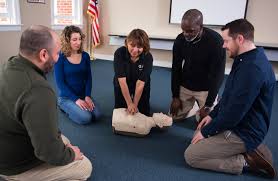Introduction
In our busy world, emergencies can strike without warning. Whether it's a small injury, a medical emergency situation, or a dangerous circumstance, knowing exactly how to supply first aid can make all the difference. This is where a First Aid course comes into play. Many individuals may question what they can get from such training, and this article intends to clarify that.
By register in a First Help and CPR course, you do not simply learn more about wrapping wounds or executing CPR; you outfit yourself with indispensable skills that could save lives. So, what exactly will you learn in an extensive program? Allow's dive into the details.

First Help Essentials: What You'll Learn in an Extensive Course
Understanding Initial Aid
What is Very first Aid?
First aid refers to the first help given to a person suffering from an injury or disease up until specialist clinical aid shows up. It includes numerous techniques and skills ranging from basic wound like lifesaving methods like CPR (Cardiopulmonary Resuscitation).
Importance of First Aid Training
Why Should You Take a First Aid Course?
Taking a First Aid course is important for numerous factors:
- Confidence: Knowing just how to respond in emergencies can infuse confidence. Life-Saving Abilities: The ability to execute CPR or assist with choking can save lives. Career Advancement: Lots of careers need qualification in initial aid. Community Responsibility: Being trained means you can help others effectively.
Overview of CPR
What is CPR?
CPR, or Cardiopulmonary Resuscitation, is an emergency treatment executed when a person's heart beat or breathing has actually stopped. It combines breast compressions with rescue breaths to maintain blood circulation and oxygenation till expert help arrives.
The Structure of a Comprehensive Emergency Treatment Course
What Does an Emergency treatment Course Include?
An all-round First Help and mouth-to-mouth resuscitation course normally covers the following subjects:
Introduction to First Aid Legal and Ethical Considerations Scene Safety Basic Life Assistance (BLS) CPR Techniques Choking Relief Wound Care Management Burn Treatment Managing Shock Recognizing Medical Emergencies Using an Automated External Defibrillator (AED) The original sourceLegal Aspects of First Aid
Are There Legal Ramifications Associated With Offering First Aid?
Yes, supplying first aid does lug legal obligations known as "Do-gooder regulations." These laws shield people who help others in emergency situations, provided their activities are affordable and not reckless.
Scene Security: The Very First Step
How Do You Make sure Scene Safety?
Ensuring scene security involves analyzing the environment prior to coming close to the victim:
- Look for prospective hazards (traffic, fire). Make certain it's secure for both you and the victim.
Basic Life Assistance (BLS)
What Role Does BLS Play in Emergency Situation Situations?
Basic Life Support consists of the principles of maintaining life features till additional medical help gets here. This section covers crucial skills such as:

- Checking responsiveness Activating emergency situation services Performing top quality upper body compressions
Advanced CPR Techniques
What Are Advanced Techniques Covered in CPR Courses?
Advanced methods might include:
- Two-rescuer CPR Use of barrier devices for rescue breaths Special considerations for babies and kids
Choking Alleviation Techniques
How Do You Aid Someone Who is Choking?
Choking relief includes two important techniques:
The Heimlich maneuver for adults. Back strikes and upper body thrusts for infants.Wound Care Management
How Do You Appropriately Take Care Of Wounds?
Effective injury management includes:
- Cleaning the injury with saline or tidy water. Applying antibiotic ointment. Covering it with sterile dressings.
Burn Treatment
What Are Effective Techniques for Treating Burns?
Burn therapy varies by level:
Cool the melt under running water. Cover it with non-stick dressings. Seek clinical attention for extreme cases.Managing Shock
How Is Shock Recognized and Treated?
Recognizing shock consists of seeking signs and symptoms like light skin, fast pulse, or complication:
Lay the individual down. Elevate their legs unless there are injuries protecting against this. Keep them relax till help arrives.Recognizing Medical Emergencies
What Kinds of Medical Emergencies Need To You Understand Of?
Common clinical emergency situations consist of:
- Heart attacks Stroke Severe allergic reactions Understanding these problems helps you act quickly.
Using an Automated External Defibrillator (AED)
How Do You Make use of an AED Correctly?
Using an AED entails transforming it on, connecting pads according to pictures on the gadget, and complying with voice motivates carefully.
Importance of Continuous Learning
Why Is Constant Understanding Important in First Aid Training?
Continuous learning ensures you remain upgraded on best practices and new protocols in first aid care.
FAQs About First Aid Courses
What Is Consisted of in a Requirement First Aid Course?- A typical program normally covers basic life support, injury monitoring, choking alleviation techniques, and legal considerations.
- Most programs range from 6 hours to 16 hours depending upon the deepness of web content covered.
- Yes, upon successful conclusion of most courses, participants get a first help certificate, which is usually valid for two years.
- Yes! Many organizations use online courses that give versatile understanding atmospheres while still being effective.
- Absolutely! Hands-on method is important for grasping skills like chest compressions and making use of AEDs effectively.
- Generally, there are no age constraints; however, participants have to be emotionally proficient to discover these life-saving abilities effectively.
Conclusion
Enrolling in a thorough emergency treatment course outfits individuals with essential knowledge that can save lives throughout emergency situations-- whether in your home, job, or out in public areas! From recognizing fundamental life assistance procedures like CPR to finding out how to manage injuries properly or acknowledge indications of shock-- these programs offer indispensable training that any person can profit from!

As we navigate via our daily lives full of unpredictability-- what much better method than preparing ourselves with understanding first aid course details gotten from organized training sessions focused on conserving lives?
In final thought-- if you're considering occupying any type of type of first-aid training-- never ever be reluctant! Outfit yourself today with these effective devices since preparedness genuinely http://dominickaukj428.lowescouponn.com/cpr-training-opportunities-in-your-location-a-lifesaver-s-guide makes all the difference when every second counts!